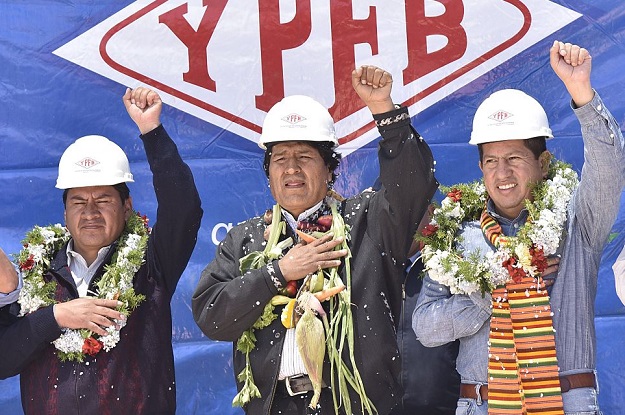On his 100th day as president, Evo Morales sent the military to occupy Bolivia’s oil and gas fields in a bid to nationalize reserves of its most important resource. It was a dramatic statement that captured attention in Bolivia and beyond.
A decade later, Morales is adopting a more pragmatic approach. There’s little fanfare this time, but it’s getting attention where it counts: among foreign firms eager to tap into the country’s vast unexplored reserves.
“There is significant gas potential in Bolivia but it hasn’t been explored, mainly due to operators’ perception of country risk,” said Will Holland, the CFO of Echo Energy, an independent British oil explorer that signed a deal for an 80 percent stake in a 75-square-kilometer block in southern Bolivia.
“A single well can produce 150 billion cubic feet of gas,” he told AQ. “You won’t find that in many places in the world.”
Echo Energy’s deal wasn’t the first in this new wave of interest. In the past two years a number of international oil majors – including Petrobras and Gazprom – have announced multi-billion dollar investments in Bolivian gas exploration projects. But Echo Energy’s deal, while much smaller, suggests Bolivia’s investment environment has become safe enough to attract smaller, independent firms without political cover. This would represent a new era of investment, said Sergio Guzman, an analyst for political risk consultancy Control Risks.
“To date most investment in the sector has come from state oil companies and majors from friendly nations such as Russia, Argentina and Spain, which benefit from privileged diplomatic relations,” said Guzman. “The entrance of Echo Energy shows that there are independent firms with the risk appetite to work in Bolivia.”
Examples of how political risk and poor government administration can hamper natural resource exploration abound in Latin America. Venezuela’s current economic collapse has its roots in the epic mismanagement of the world’s largest petroleum reserves by the state-run oil firm. Brazil’s state oil firm Petrobras, is the epicenter of the continent’s largest ever corruption investigation. In Mexico, oil production has been in steady decline since 2004 while Pemex has racked up huge debts due to poor investment decisions and excessive government interference.
In countries more open to foreign investment, such as Colombia and Peru, critics often argue that oil and mining projects are sold off too cheaply, with foreign firms profiting disproportionately with limited benefits to the local economy.
Bolivia under Morales is different. Historically, the country’s gas reserves – the second largest in South America – have been a source of conflict. In the 1930s, the country fought a war with Paraguay over the Chaco scrublands, thought to be rich in hydrocarbons. In the early 2000s, the growth of the gas industry in the eastern lowland city of Santa Cruz provoked a separatist movement.
Since Morales’ election, however, the Bolivian national gas industry has been used to fuel growth and improve social conditions, according to Roberto Calzadilla, Bolivia’s ambassador to the UK. Government revenues from hydrocarbons have grown from around $500 million per year in 2006 to $6 billion by 2016. This bonanza has rippled throughout the economy: Annual GDP growth has hovered around 5 percent since 2010, while extreme poverty has halved from 36 percent of the population to 17 percent, according to World Bank Data.
“The nationalization of the gas industry has changed the country, lifting two million Bolivians into the middle class,” said Calzadilla.
Despite complaining bitterly about nationalization, most oil companies remained in country and simply adjusted to less profitable contracts. The Morales government has also slowly paid $828 million in compensation to firms nationalized across a range of business sectors – around 24 percent of the amount demanded by companies initially.
Now Bolivia is at an important crossroads. Morales is interested in building on existing industry to become an energy hub to the southern cone, exporting gas and electricity to Brazil and Argentina.
To that end, the national hydrocarbons company YPFB has announced a ten-year, $30 billion investment plan aimed at building pipelines, power generation plants and downstream projects such as ammonia plants and gas-liquids separation projects to extract added value from gas reserves.
To provide the feedstock for these projects the Ministry of Energy is planning to increase its proven gas reserves from 10.5 trillion cubic feet in 2016 to 18 trillion cubic feet in 2025. But while YPFB was reorganized since the nationalization and has become an efficient distributor, it still lacks the financial muscle and expertize for expensive, and risky, exploration projects, Guzman said. Expanding capacity would require foreign investment, foreign cash and know-how – and attracting this kind of foreign investment would in turn require greater incentives and guarantees. That is Echo Energy’s big bet.
“If Bolivia wants to fulfill its potential as a major energy producer it will need to make it more attractive to develop marginal fields,” said Holland. “Echo Energy is positioning itself for that eventuality.”
There are signs that a broader regional shift is underway. Since oil and metal prices began falling in 2014, some Latin American countries governed over the last decade by leftist governments have dramatically changed tack on foreign investment in resource projects. Ecuador and Nicaragua, still ruled by left-wing parties, have sought mining investment as a way to attract foreign currency inflows. In Argentina, the Macri government has offered shale gas operators a guaranteed buy price to stimulate development of the country’s huge Vaca Muerta basin.
Bolivia can afford to do this incrementally. It stashed enough gas revenues away during the boom years to soften the effects of the commodity slump. It also maintains state control over a number of strategic assets – although even there, its tough stance appears to be softening.
On the wall of Calzadilla’s office is a framed photo of Bolivia’s iconic Salar de Uyuni salt flat. In the foreground, the word “litio” has been carved into the salt. Bolivia contains the world’s largest reserves of lithium, the in-demand metal used in phone batteries, electric cars and more. The government has pledged to keep its nascent lithium industry under national mining firm Comibol, developing its resources with foreign firms with the aim of exporting 5,000 tons of lithium cathodes by 2021. But this year, for the first time under Morales, Bolivia showcased its mining opportunities at PDAC 2017, the world’s largest mining conference.
All this indicates that Bolivia might be loosening its strictures on foreign presence in key industries – but is keeping its priorities in place. Interested parties can benefit from greater participation, but should respect the firm line the Morales government has taken with respect to the state’s sovereignty over natural resources, said Calzadilla.
“We work with partners, not patrons,” he said.
—
Youkee is an independent journalist and analyst based in Bogotá. Follow him on Twitter: @matyoukee.







